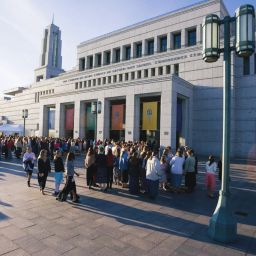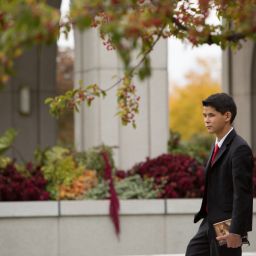Chopping wood sucks.
It is exhausting, sometimes blazing hot and sometimes freezing cold, dangerous, painful, sweaty, backbreaking work.
I grew up with a friend whose dad had stored up endless piles of logs used for fuel in the family fireplace. When my friend got in trouble with his dad, he got sent out to chop wood. I’d often help and we’d slog through the pile together, miserable and resentful.
But there was another time I went and chopped wood for a widow in my ward. She didn’t come out to see me or anything, so there was no expressions of gratitude or anything like that. But at the same time it was memorable. It was memorable because I noticed, for the first time in my life, I was feeling really good while I was chopping wood.
So in one circumstance I was working with a friend and filled with anger and frustration. In another circumstance I was still having all the negative experiences of chopping firewood, but I also felt something really positive.
What was the difference?
How Hyrum Smith Got To Know The Spirit
 We need to remember that God often uses natural things to connect with us. A great example is our first encounters with the spirit. Often we first learn to recognize the spirit by noticing the feelings we have when the spirit connects with us. Before the founding of the restored church, when Hyrum wanted to know how to know the truth – how to recognize the spirit – the Lord said to pay attention to the feelings that accompany the presence of the spirit – enlightenment, joy, humility, etc. (see D&C 11:12-13)
We need to remember that God often uses natural things to connect with us. A great example is our first encounters with the spirit. Often we first learn to recognize the spirit by noticing the feelings we have when the spirit connects with us. Before the founding of the restored church, when Hyrum wanted to know how to know the truth – how to recognize the spirit – the Lord said to pay attention to the feelings that accompany the presence of the spirit – enlightenment, joy, humility, etc. (see D&C 11:12-13)
But it’s important to remember that these feelings are NOT the Holy Ghost. Many believers stop at this introductory level of communion with the spirit, waiting for “feelings” to signify the presence of the Holy Ghost. In fact, it’s common for us to confuse our emotions with the spirit in our language, saying things like “I felt the spirit” when talking about strong emotions. God may use strong emotions to get us to pay attention, but not ALL emotions are from the spirit.
The Natural and the SUPERnatural
In reality we’re talking about two things: The natural and the supernatural. Our feelings are totally natural functions of the human body. They can be reproduced with chemicals and external stimuli. Strong feelings can happen due to practically anything, and are just ONE of the many tools our Heavenly Father uses to communicate with us. Not every strong feeling is from God.
John Lennox points out that the “supernatural” is something that comes from outside the natural, and that we shouldn’t think of the unexplained but natural phenomenon as being supernatural. That’s important to remember. Science will probably someday be able to reproduce and explain the “what” behind many things that we experience – those things are the “natural” part of our experience. And that’s ok! It doesn’t reduce or cheapen our experiences to know the physiology behind them. We just need to recognize when the trigger, the source behind the experience, was divine; and have faith to accept it as such.
Think of Hyrum. He had certainly experienced enlightenment, humility, joy, etc. before. Now God was telling him to pay attention to those experiences he would have in his calling in the church and trust that they would be caused by God. The tools God was using to guide him were natural experiences Hyrum had had before. But in combination with his upcoming calling the natural experiences of “feelings” would be turned into spiritual guidance and an introduction to greater revelation.
If we choose to only identify the things we can’t explain as coming from God, then we limit ourselves and force ourselves to be in an ever shrinking window. This is called the “God of the Gaps.” It’s when you force a supernatural explanation onto something not yet understood in a natural setting. Early Christians did this with phrases from the Bible. Without knowing the natural function of the earth, they read about earth having a “fixed foundation” in the bible and simply assumed the earth didn’t move and everything rotated around it. This caused friction when science came along with a contradiction. The problem was forcing the supernatural and symbolic statements of the Bible onto a natural question without thought.
Compare that to how the Lord advises Hyrum. In essence Hyrum is told: “Take the natural experiences of these positive emotions and have faith that they’re being triggered by God while in your calling.” God promises limited interaction in specific instances, and invites us to believe.
The combination of the natural and the divine
I think it’s worth noting that there are a few “gaps” where it’s valuable to look to God. The thing I’m thinking of is something called “emergence.” It’s a phenomenon we can’t really explain. Here’s an example: How is it that chemistry becomes “life?” How is it that neurons in a brain become “consciousness?” John Lennox, again, suggests that the message of Genesis in the Bible isn’t the “naturalist” message of “God created the earth in a literal 7 days from scratch” but rather might be that “you don’t get from physics to chemistry to biology to consciousness without God’s supernatural intervention” – that God might be found in the inexplicable property of “emergence.” You can watch his interesting presentation on this idea here: https://www.youtube.com/watch?v=0FmO2XKMe6g (he’s not LDS, so there are some views which don’t mesh with Latter-day Saint philosophy).
Looking for emergence is another way of seeing the same thing I mentioned before. God told Hyrum that these perfectly mundane “feelings” that Hyrum had certainly experienced before were going to be elevated and transformed into communications from God while he served in his calling. That’s emergence again! It requires the presence of the supernatural (the Holy Ghost) and our faith to accept it, but it happens. The emergence of “miracle” from “natural” happens when God uses the normal and natural for his purposes. We experience it for ourselves when we are engaged in serving as Jesus would serve.
We see this emergence happen all the time in our faith. Think of the brass serpent, Joseph Smith’s seerstone, Jesus’ robe. None of these things were supernatural. They were natural or man-made objects pressed into the service of the divine. And when that combination occurred, miracles happened.
In his landmark speech, “Gifts of the Spirit for Hard Times,” Elder Eyring taught that our encounters with the Holy Ghost can come most powerfully and most frequently as we are engaged in the service of others. This also matches the promise made to Hyrum and all those who went forward to serve in the early church, that God would use the normal, natural, explainable parts of our lives to accomplish miracles.









